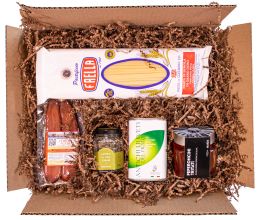"At Faella they still use bronze dies, which give the pasta a rougher texture, with microscopic crannies for catching sauce."
The New York Times
"One of my favorite. I think that people have gotten so used to the idea of cheap pasta, that they don’t realize that there is alternative that tastes completely different. And better."
Elizabeth Minchilli
"Faella, a family-owned company in Gragnano, near Naples, makes pastas in the traditional fashion, extruded through bronze dies and slowly air-dried before packaging."
Florence Fabricant in the New York Times
"Faella produces the best, most perfect pasta."
Serious Eats
“Faella is every bit artigianale!”
Camille Frazier
"I also wanted to mention Faella pasta, my new favorite brand. I cook a lot of different brands of dried pasta, but lately this one has really been speaking to me."
Erica de Mane
" Despite advances in technology and greater regulation, Faella still primarily relies on a pasta-making technique the company developed more than 100 years ago."
Tasting Table
"Made from Italian wheat and cold water, using old machines with bronze dyes to made a coarse pasta that grabs onto sauce. Pasta Faella just tastes better."
Andrew Zimmern
"With simple recipes, ingredients make all the difference. If you can get imported pasta, then use it. I love Faella, which comes from Gragnano, outside of Naples."
Elizabeth Minchilli
"Pasta for Discerning Macaroni-Eaters”
Culinary Backstreets
“Faella pasta has a rough surface, perfect for better absorbing the sauce, thanks to the extruding that is still done with bronze dies.”
Amedeo Colella
"The difference in taste, in texture and in the finished dish is hard to describe here, you’re just going to have to experiment yourself."
Elizabeth Minchilli
"Faella is an old family-run company, started in 1907. In my opinion it’s still doing everything right."
Erica de Mane









